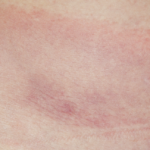I wish it were so. Although numerous studies have shown that the risk of developing various disorders (e.g., heart disease, colon cancer, hypertension, diabetes, to name but a few) may be reduced in vegetarians, it’s not an absolute cloak of protection. This is a difficult truth for some vegetarians to accept: Sometimes horrific disease happens to good people on healthy diets. This explains why, when an unexplained illness hits, many vegetarians further restrict dietary intake. I asked Lynn if she had changed her diet recently.
“No, I’ve been a vegetarian for 10 years. No change there. Well, that’s not exactly true,” she added. “For the last two months, after this hit me out of the blue,” she held out her hands, “I’ve eliminated gluten. And last month, after reading about vegetables in the nightshade family triggering arthritis—you know, tomatoes, potatoes, sweet peppers—I took them out of the mix as well.”
“And has that helped?” I asked.
“Not yet.” She shook her head in puzzlement. “But last week I eliminated milk and milk products and started supplementing with bromelain, borage oil, devil’s paw, willow bark, fish oil and turmeric.” Her son stirred from his nap. Cooing in a soft, caressing, sing-song lilt, she leaned forward and rocked the carrier until he settled down again.
“And has that helped?”
“They say it takes time for the toxins to be eliminated.”
From past experience, I knew where this was headed, but I persevered. “The supplements might help a little, but in my experience they don’t help with this degree of inflammation. I wish it were as simple as eliminating this food or supplementing with this nutrient.” I paused, but she was closing down, categorizing me, her mind made up to avoid prescription medications.
The haunting image of a young woman, no older than Lynn, came to me. Years ago, while lecturing on arthritis care at a rural hospital outside of Bangalore, India, I was asked to make a home visit. I agreed, and was taken to a tin-roofed, cement-block home set on the edge of a dry, golden field of wheat. Entering, my eyes took time to adjust to the cool darkness inside. A cot with a rumpled white sheet was at the far end of the room. The mother lightly touched my arm. Her daughter lay beneath the sheet, 26 years old, 85 lbs., her hips and knees contracted to her chest, her elbows unable to extend and her fingers unable to flex or pinch or grip.



